April 18, 2016
by Carole Zangari -
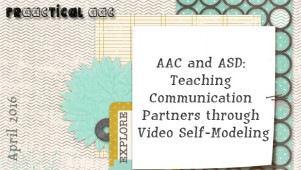
It is an honor to have Dr. Joanne Cafiero, an AAC consultant for individuals with complex communication needs and Autism Spectrum Disorders, as a guest contributor for today’s post. Dr. Cafiero is the author of Meaningful Exchanges for People with Autism an Introduction to AAC (2005). She is a consulting editor for Focus on Autism and Other Developmental Disabilities and has guest edited several of ASHA’s Perspectives in AAC. She was a member of the National Academy of Sciences Committee on Educational Interventions for Children with Autism (2001) and is currently working on an update on AAC and Autism for the Academy. In this post, she shares some of her work on video self-modeling. ::::::::::::::::::::::::::::::::::::::::::::::::: Growing research and first-person reports are illuminating the unique sensory and motor differences experienced by people on the Autism Spectrum. This new information has a huge impact on the AAC practitioner. Motor planning differences in ASD can... [Read More...]
September 8, 2015
by Carole Zangari -

It isn’t every day that we get to hear from AAC interventionists who’ve been doing this work for decades. Today, we are thrilled to welcome back SLP Marlene Cummings from Oakland Schools in Michigan. Marlene has written several very popular posts on AAC in educational settings. (Click here to peruse them.) In this post, Marlene gets us thinking about ways to deal with change in a positive and sustainable fashion. Her passion for supporting both kids and colleagues is infectious. Enjoy! :::::::::::::::::::::::::::::::::::::::::::::::::::::::::::::::::::::::::::::::: I have the privilege, as part of a 5 member AAC Team, of supporting 28 school districts with more than 100 teams serving students with complex communication needs using AAC. The staff members and teams we support come with varied levels of knowledge, diverse experiences, and degrees of confidence. For us the new school year is just around the corner. We are already receiving calls and emails reporting... [Read More...]
September 8, 2014
by Carole Zangari -
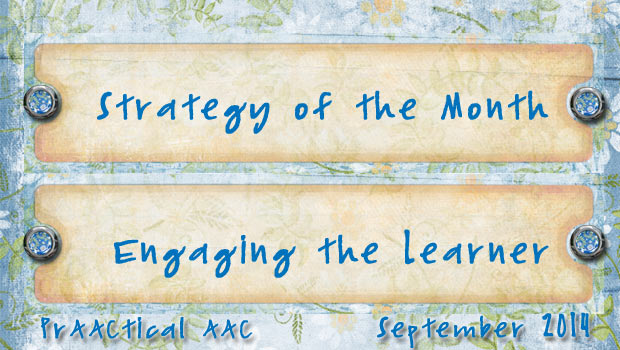
Summer is over in our part of the world and that means we get the opportunity to work with a whole new crop of students and clients. There is so much for beginning clinicians to know about providing AAC services that it is intimidating at best and overwhelming in most cases. In previous posts we’ve written about expectations, goal-setting, intervention strategies, therapy activities, reinforcement, feedback, and the like. This month, we’ll focus on a construct that permeates everything: engagement We all know what it looks and feels like when a client is engaged, but how do we make that happen? Here are some thoughts. 1. Start by presuming that your client is a learner on his/her way to developing competence. Good intervention, consistent language models, the right tools, and plenty of practice will move them along the journey toward improved communication. It’s important that, as clinicians, we truly believe that.... [Read More...]
December 31, 2013
by Robin Parker -
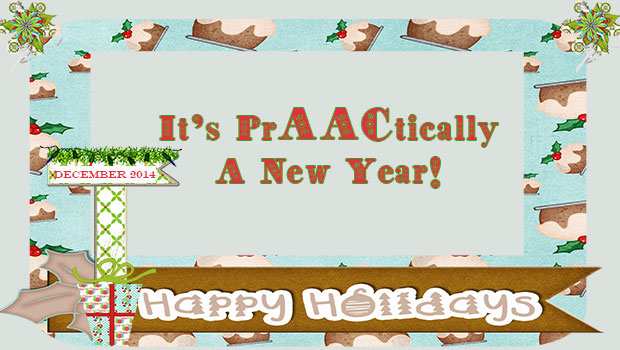
It is just about 2014. Hard to believe another year is finished and we are moving on once again. Our wishes for 2014 are for ALL Learners to have access to: Aided Language Input Communication Displays that meet their needs Role Models Presumed Competence Core Word Instruction Fringe Word Instruction Friends Many Meaningful Language Experiences Frequent Communication Opportunities Fun Learning Our Wishes for ALL SLP’s and Educators to have access to: An Exciting and Stimulating Personal Learning Network (PLN) Appropriate Goals and Strategies Meaningful Language Experiences Role Models Laminator and Laminator Materials Literacy Materials Core Word Highlighter Tools, Page Fluffers & Spacers, Apps for Learning Language An AAC Philosophy Fun Teaching
July 13, 2013
by Robin Parker -
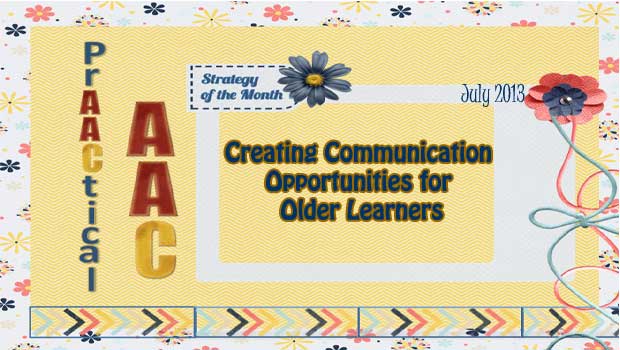
The Strategy of the Month involves AAC and the ‘older learner’. The ‘older learner’ involves a range of ages (We are ‘older learners’ for way longer than we are children) as well as a wide range of functioning levels. Even with this variation though, we know that ALL older learners can learn. There are challenges with ‘older learners’ that need to be addressed in order to facilitate spontaneous and generative communication and language. The challenges may result from years and years of going to intervention (some of it effective, some not), from perceived failure by the learner and/or the professionals, or may even just be related to that ‘teenager or adult’ independent streak. These challenges can definitely be overcome in order to help develop a functional and robust communication system for ALL learners. Just remember respect the learner as a competent teenager or adult (e.g., think what a typical language... [Read More...]
October 27, 2012
by Robin Parker -
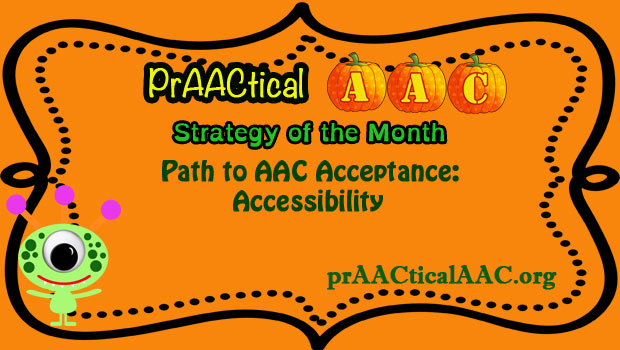
It is AAC Awareness Month and everyone has really been spreading the word and helping to build AAC acceptance. Participation barriers continue to prevent full AAC acceptance. In order to help combat these obstacles it is necessary to talk about them, deconstruct them, and attempt to build solutions. So after going over attitudinal barriers and information barriers, we need to discuss accessibility barriers. It’s a shame that there are so many barriers to making AAC work, but we know that with awareness comes improvement. Barriers of accessibility can be about motor, sensory, cognitive, literacy, or communication/language issues. For this discussion though the focus is on accessing AAC to learn a comprehensive language in ALL modalities (i.e., talking, listening, reading, & writing). The prevention of access to a comprehensive system is usually tied in to assumptions about cognitive and literacy skills. Although it seems that most professionals realiize that there... [Read More...]





